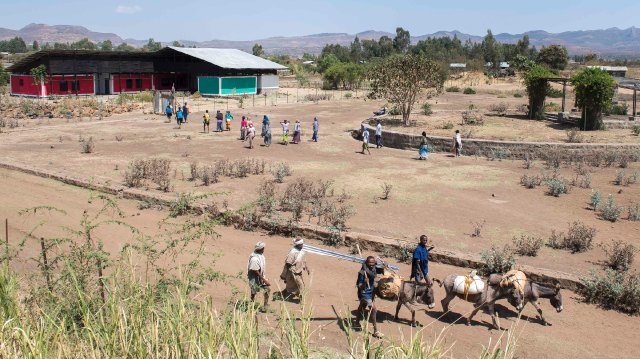 Ethiopia's population has tripled over the past few decades [from 30 million to over 100 million since the 1970s]. Millions of farmers are leaving the fields only to end up living in the slums of huge cities. City planners believe they have found a solution -- in the remote countryside. (Photo: Spiegel Online)
Ethiopia's population has tripled over the past few decades [from 30 million to over 100 million since the 1970s]. Millions of farmers are leaving the fields only to end up living in the slums of huge cities. City planners believe they have found a solution -- in the remote countryside. (Photo: Spiegel Online)
The Plan to Bridge the Urban-Rural Divide
Stories about people embarking on their future usually start with a departure. But the story of farmer Birhan Abegaz is different. He plans to stay put right where he is in his quest for happiness — a treeless wasteland in northern Ethiopia.
The crooked huts of his village, Bura, are surrounded by solitary thorn bushes and acacias. Birhan is cultivating rice on a patch of leased land behind his hut, at least during the rainy season. A few months have passed since the harvest. The dry season is here, and the earth is dusty. The Shine River, Bura’s lifeblood, is nothing but a trickle.
Married with three children, Birhan is only 28 years old, but the hardness of rural life has taken its toll on him and he looks much older. He fetches the family’s water for drinking, cooking and washing from about a kilometer away. The nearest well is on the other side of the highway leading to the provincial capital of Bahir Dar, a two-hour drive away. In the past, many people from Bura and the nearby villages took this road, turning their backs on the countryside in search of a better life in the city.
What Can Keep the Farmers in the Countryside?
Since the 1970s, Ethiopia’s population has more than tripled, going from 30 million to over 100 million. In the countryside, overpopulation is leading to the overuse and overgrazing of fields and deforestation. More and more people are moving to the big cities, which are growing faster than the rest of the country. The provincial capital of Bahir Dar had about 60,000 inhabitants 30 years ago, but today it has 350,000. “Apartment buildings, streets, the drinking-water supply and the entire infrastructure can’t keep up with this tempo,” says Ethiopian city planner and architect Zegeye Cherenet.
As a result, new arrivals end up living on the streets or in slums. In the early mornings in Bahir Dar, dozens of ragged young men stand at the intersections in the hope of picking up work as day laborers. In the evenings, their sisters and mothers go to the square and wait for johns.
—
Join the conversation on Twitter and Facebook

























